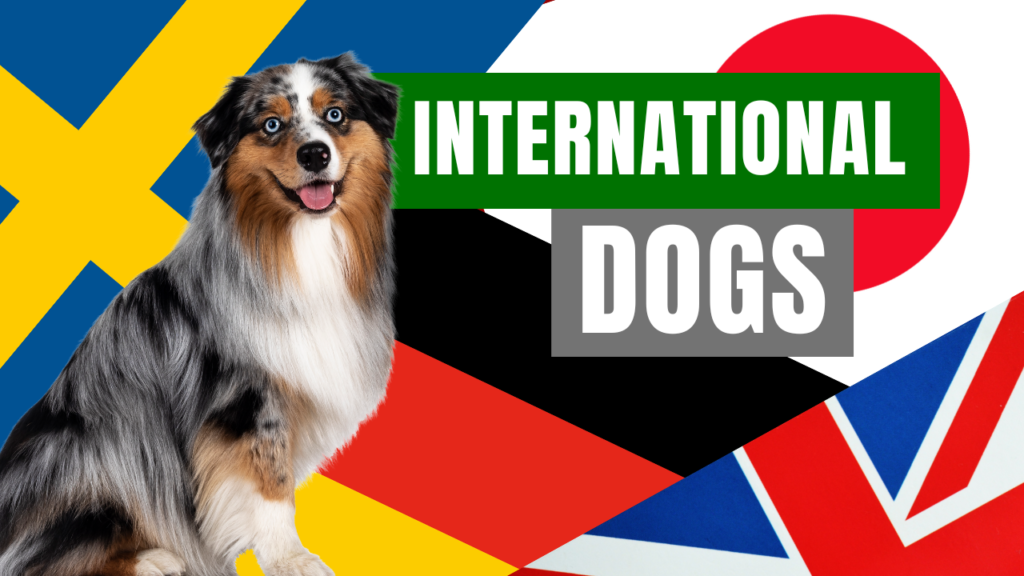For millennia, dogs have been companions to humans worldwide, from the steppes of Asia to the peaks of the Alps, from the deserts of North Africa to the shores of Newfoundland. Dogs are our beloved friends, valued workers, and team members in dog sports competitions and performance events in the United States.
Hello and welcome to Dog Works Radio. I am your host, Michele Forto, and the lead trainer of Alaska Dog Works, where we help you develop the best relationship possible with your dog. Today, we are discussing International Dog Culture in other countries compared to our own. Here’s a quick look at attitudes toward dogs across the globe.
Germany
Owners can take their dogs with them almost everywhere in Germany, including in most stores and restaurants, on the subway, and even at workplaces. To accomplish this, Germany has adopted strict regulations regarding the care and training of die Hunde, and German society has high expectations of dog owners.
Germany has a no-kill policy; provisions for animal rights and protection are included in the country’s constitution. German dog owners can expect to pay a dog tax, approximately $140 per year for one dog and an additional $210 annually for a second dog. In some German states, legislation requires dog owners to pass written and practical tests, much like applying for a driver’s license.
Germans expect dogs to be well-behaved in public and at home. When interviewed by NPR on this topic, Gianluigi Riccio likened the results—well-trained and well-socialized dogs—to “dog heaven.”
England
It’s not unusual to see dogs nearly everywhere in England, too—in pubs, grocery stores, public transportation, and many shops and retail stores. Certified dog trainer and CGC evaluator Jacqui Foster, CPDT-KA of Ren’s Pups, LLC, has trained dogs in England and notes that the English “take their dogs seriously and training is a part of their everyday life. By taking them everywhere, the dogs and their people learn to trust each other more, leading to a calmer, more confident team.”
Foster recalls being impressed with the behavior of a dog who was “parked (left in a sit-stay) outside of a little shop, and that dog stayed and waited on her human for about five minutes. She never wavered, just waited. Not tethered to anything, either.”
England’s affection for dogs and other animals has a long history. According to historian Jane Hamlett, in 1824, Britain became the first country in the world to establish a welfare charity for animals. Foster adds, “Dogs are considered a part of the family there, and each has their job to do. I love the dog culture in England; they equip their lives, homes, and cars [to accommodate their dogs] and allow them to run free, knowing they will come back and check in because they’ve been training that since day one.”
Sweden
Do you walk your hund often enough? By Swedish law, you must do so at least every six hours. Indoor dogs must have a view from a window that provides sunlight. Dogs can travel with their owners on public transportation and are often allowed in workplaces.
As in England and Germany, the Swedes also prioritize training their dogs and giving them jobs. Becoming a member of a dog training club or association is encouraged, as is participation in dog sports and competitions.
Japan
The Japanese word for dog is inu—as in the Shiba Inu and the Japanese Akitainu, and domesticated dogs have been a feature of Japanese life since 10,000 BCE.
In Japan today, prepare to see plenty of dogs dressed up in one fashion or another—wearing a jacket or coat, a hair bow, sunglasses, or even jeans. Dog strollers abound, and dogs are welcome in certain dedicated restaurants, where they can even sit at the tables and dine with their owners.
Despite this, however, only a minority of the country’s population own dogs. It can be hard to find a dog-friendly apartment in crowded urban areas. Dogs that weigh more than 22 pounds aren’t allowed on public transportation like buses, trains, or taxis. Nor are dogs permitted off-leash in Japanese parks.
According to dog owner Simon Denyer, Japanese owners not only clean up after their dogs, but they often have a water bottle called “manner water” to wash down anything their dog has urinated on. Denyer reports that, in a society that reveres good manners and thoughtfulness toward others, some dog owners carry a mat with them to catch their dog’s waste before it even hits the ground.
Australia
Indigenous communities in Australia have always held a special place for dogs, dating back to the arrival of the dingo approximately 5,000 years ago. In Aboriginal culture, Dreaming stories convey cultural values, tradition, and knowledge. Sacred locations known as dog Dreaming sites can be found across the Australian continent. In addition to providing physical protection, they believe that dogs can provide spiritual protection against evil spirits, particularly at night.
This importance accorded to dogs appears to extend across Australia. When Australian dog-food manufacturer Scratch conducted “The Great Australian Dog Survey” in May 2020, in which 20,664 Australians participated, results showed that two-thirds of respondents reported spending more than six hours a day with their dogs. Half of those surveyed said they’d take a pay cut to spend more time with their dogs.
Three out of four of those who participated in the survey indicated that they choose breeds they believe to reflect their personalities. The Labrador Retriever was identified as the most popular breed among those surveyed, so hopefully, the owners can match this breed’s famed, friendly, and good-natured personality!
That’s it! What questions do you have for us? Let us know on our socials, and we will do our best to answer them in an upcoming episode.
Before we end the show, let’s press pause for a sec…maybe ask yourself, why did this resonate with me? What aspect of my relationship with my K9 buddy could I apply this to? And what am I going to do differently this week to make my dog’s training a little easier? So, take time to mull it over, talk it out with a family member or trusted friend, put some ideas down in your training journal, and then check back next week for our next episode.
And as always, I look forward to hearing your thoughts on this episode. So, reach out and find me on Instagram at akdogworks, and let’s spark a conversation. Until then, keep going! You are doing great! It is time to create the relationship with your dog that you always dreamed of.
Thanks for listening to Dog Works Radio. Find the show notes for this episode and all others at Alaska dog works (dot)com. Know someone in your life who needs help with their dog’s training? Be a hero and share our podcast with them, and we will see you next time.
Why trust us
At Dog Works Radio, we’re committed to producing high-quality content by a team with expertise and experience in their field in consultation with relevant, qualified experts.
For this piece on International Dogs, Michele Forto tapped her experience as a longtime dog trainer, podcaster, and dog owner. We rely on reputable primary sources, including government and professional organizations and academic institutions, and our writers’ personal experiences where appropriate. We verify all facts and data, back them with credible sourcing, and revisit them over time to ensure they remain accurate and current. Read more about our team, our contributors, and our editorial policies on our website, Alaska Dog Works.com
We offer a FREE Strategy Call.
Click on the graphic to learn more
Read More










